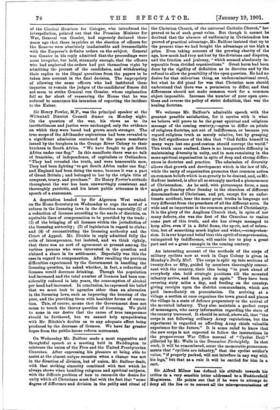On Wednesday Mr. Balfour made a most suggestive and thoughtful
speech at a meeting held in Paddington to celebrate the union of the Free and the United Presbyterian Churches. After expressing his pleasure at being able to assist at the almost unique occasion when a change was not in the direction of division, but of union, Mr. Balfour dealt, with that striking sincerity combined with tact which he always shows when handling religious and spiritual subjects, with the difficult problem of how to reconcile the desire for unity which all Christians must feel with the fact that "some degree of difference and division in the polity and ritual of
the Christian Church, of the universal Catholic Church," hae proved to be of such great value. But though it cannot be doubted that the absence of uniformity in Christendom has proved of practical advantage, Mr. Balfour insisted that up to the present time we had bought the advantage at too high a. price. Even taking account of the growing charity of the age, how mnoh had they not lost by the divisions and dispute; and the friction and jealousy, "which seemed absolutely in- separable from divided organisations." Great harm had been done by the rigidity of definition as to doctrine and by the refusal to allow the possibility of the open question. He had no desire for that colourless thing, an undenominational creed, but what he did plead for was that Christian men should understand that there was a permission to differ, and that differences should not make common work for a common object impossible. Increase the number of your open ques. tions and reverse the policy of strict definition, that was the healing doctrine.






































 Previous page
Previous page